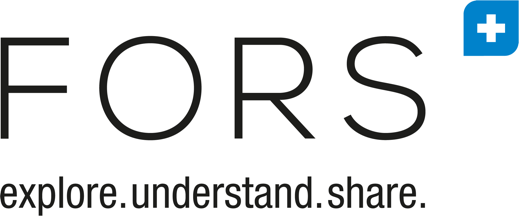Partnerships
National partners
The University of Lausanne funds a joint research programme that involves many researchers from FORS and the Faculty for Social and Political Sciences (SSP). This collaboration resulted in a high-quality platform for national and international social science methods and substantive research, recently launched at the Institute of Social Sciences of the University of Lausanne. This new platform DReMSS Developments in Research and Methods of the Social Sciences aims to promote and to create synergies between the activities developed by FORS and SSP. The involved researchers share common thematic and methodological interests. Thanks to this research programme, the teaching of quantitative methods in the Faculty of Social Sciences has been developed and strengthened, both at Bachelor and Master level.
Further, FORS and SSP jointly organise the Methods and Research Meetings where invited guests and researchers from FORS and the University of Lausanne exchange on methodological issues.
Another collaboration takes place in the field of science communication. The Centre LIVES, the Life Course and Inequality Research Centre of the Faculty of Social and Political Sciences and FORS edit together, since 2015, the series Social Change in Switzerland.
With the goal of promoting the use of public statistical data, the FORS data service:
- Offers a brief description of each survey;
- makes it possible to compare the FSO surveys and to find the ones that best address your research questions.
Swiss Coordination Centre for Research in Education – SCCRE
The SCCRE supports the exchange of information among researchers in the field of education. It operates the secretariat of the Swiss Society for Research in Education (SSRE) and houses the SSRE’s archives.
Swiss Center for Special Education – SCSE
The SCSE is a documentation center dealing with issues relating to education, schooling and the training of persons with special educational needs and disabilities. As a documentation centre, it provides an information platform, organises seminars and publishes the Revue suisse de pédagogie spécialisée as well as the Schweizerische Zeitschrift für Heilpädagogik. FORSbase hosts project descriptions and special education data.
Service de la recherche en éducation – SRED
The SRED produces a set of indicators and public statistics on the Geneva education system. It conducts research projects and carries out evaluations aimed at deepening knowledge of issues directly related to the services and activities of the Geneva education and training system.
FORS has an agreement with ARAMIS to exchange relevant information. Thus, the projects registered in this database are directly transmitted to FORS and it is therefore not necessary to register them in FORSbase. The ARAMIS database is published online.
International Partnerships
FORS represents Switzerland in the ESS ERIC General Assembly and the ESS National Coordinators Forum. FORS staff participates in coordinating bodies of the ESS and is responsible for the Swiss part of the ESS.
FORS represents Switzerland in the EVS Council of program directors and the Executive and Methodology Group. Furthermore, FORS conducts the Swiss data for the EVS.
FORS staff represents Switzerland in the ISSP Annual meeting, which decides on modules for the coming period. Switzerland currently also chairs the ISSP Methodological committee through FORS. FORS conducts the Swiss data for the ISSP.
Together with the University of Lausanne, FORS is responsible for conducting SHARE in Switzerland. FORS represents Switzerland in the General Assembly of SHARE. FORS staff participates in coordinating bodies of SHARE and conducts the Swiss data.

 Bâtiment Géopolis,
Bâtiment Géopolis, +41 (0)21 692 37 30
+41 (0)21 692 37 30

